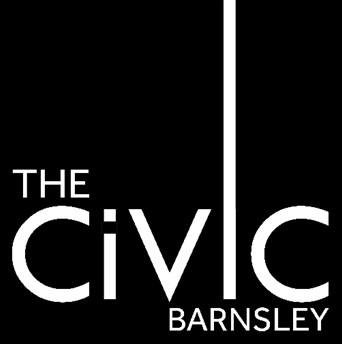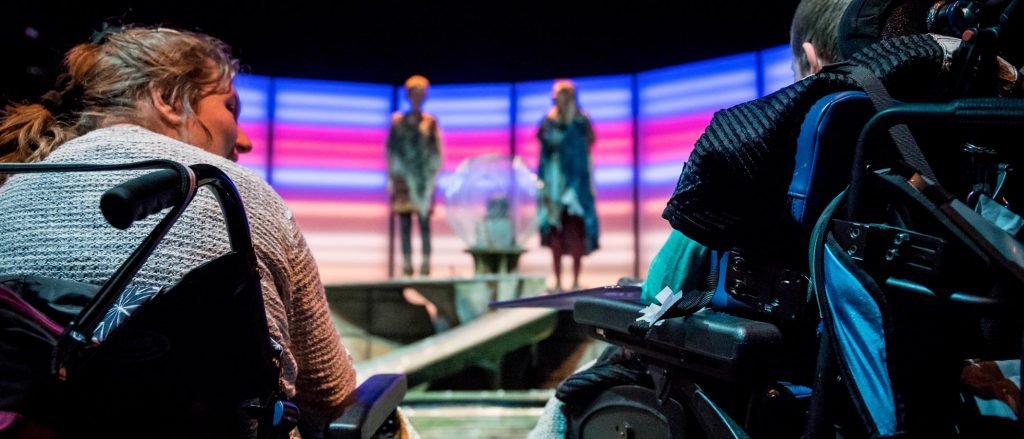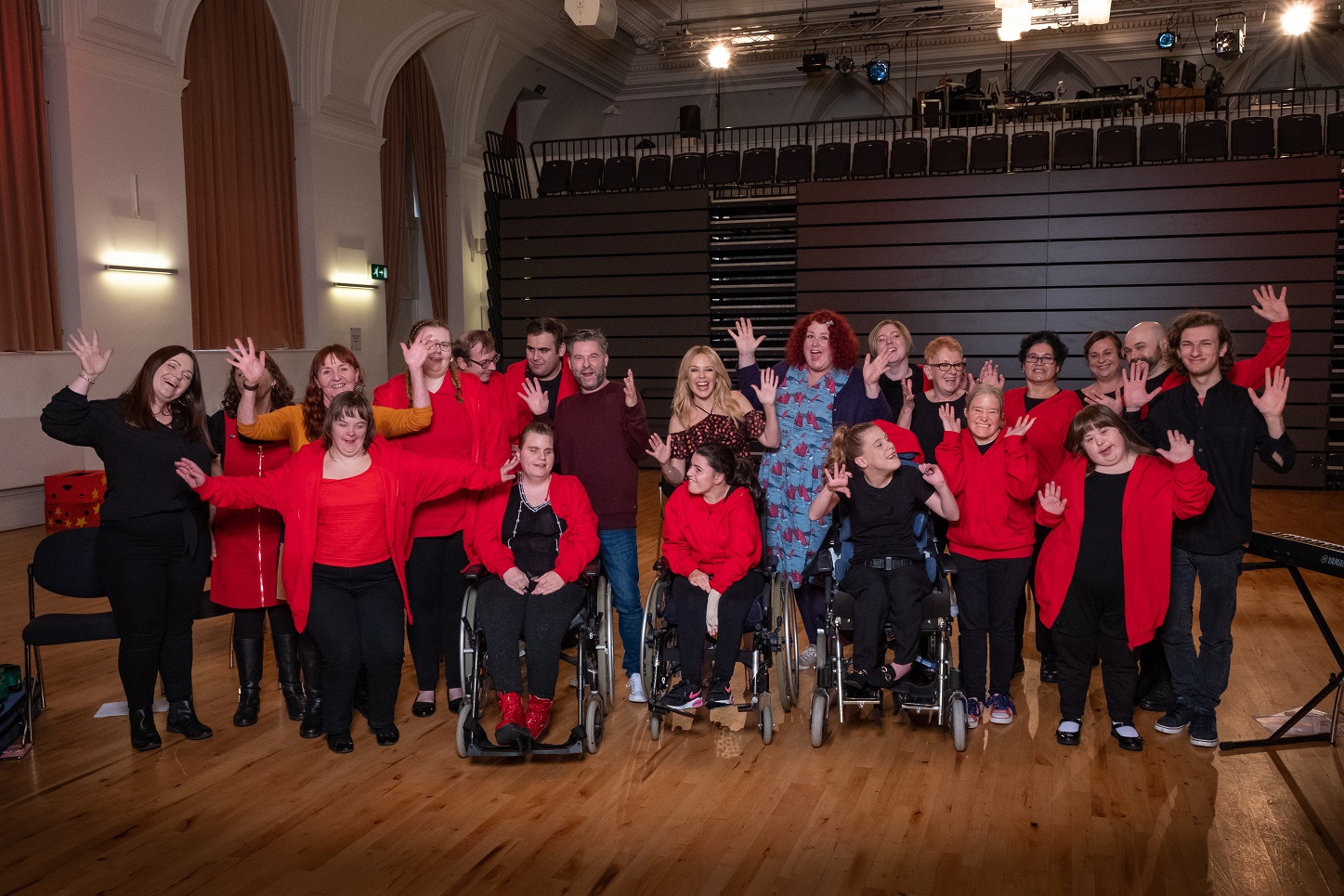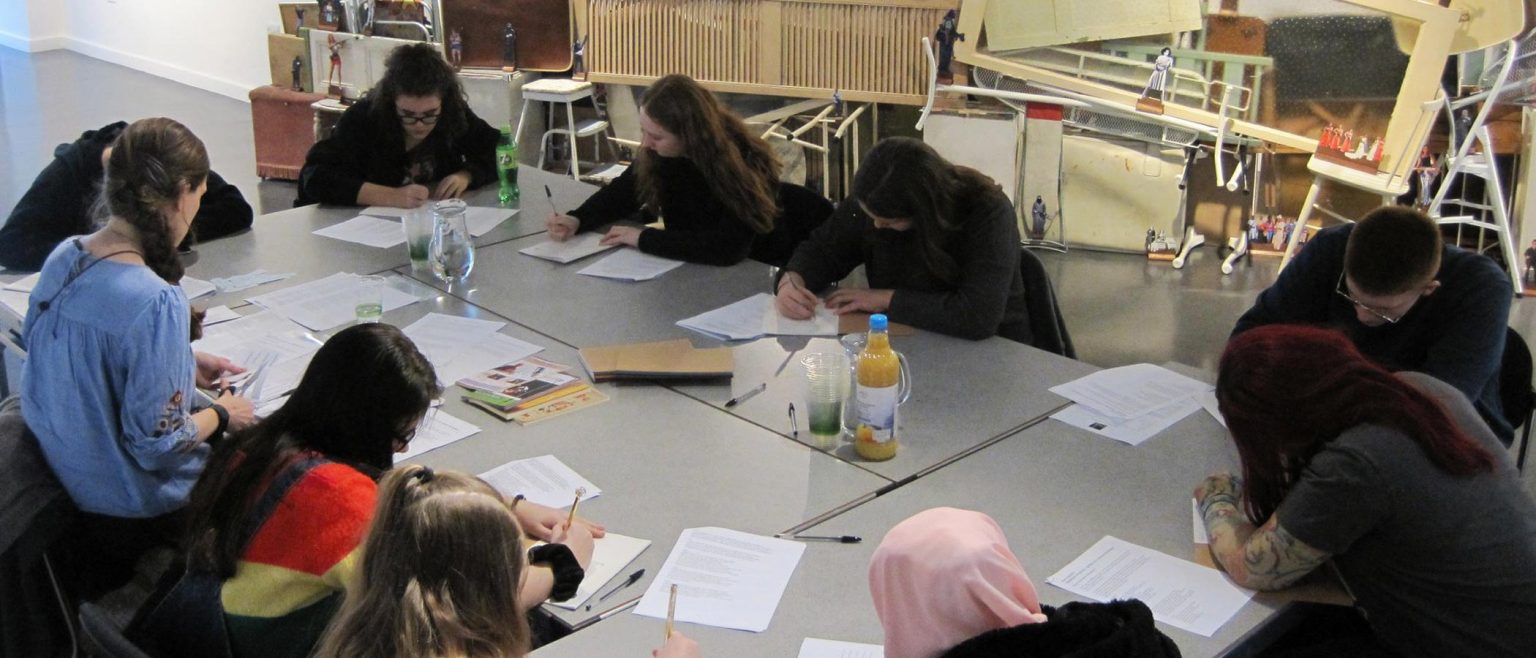Frozen Light are one of the UK’s leading theatre companies specialising in work produces for audiences with profound and multiple learning disabilities. In Feb 2021, Co-Artistic Director Lucy Garland spoke to Jason White at The Civic to find out more about creating sensory led theatre and what the past year has meant for them and their audiences.
Frozen Light is a theatre company born out of co-artistic directors Lucy Garland and Amber Onat Gregory’s learning experiences at The University of Kent, where they both found an interest in contemporary theatre with a political edge and had a desire to use theatre for change. In the beginning, they worked with six teenagers with profound and multiple learning disabilities. Mentored by Louise Coigley, who Lucy explains is not only “an amazing speech therapist but sensory story guru too”, they created the beginning of their sensory storytelling journey.
Following university, both parted ways and continued to do small scale sensory storytelling in special schools and community settings. However, in 2012 they reconnected and started developing work for adults with PMLD in theatre settings.
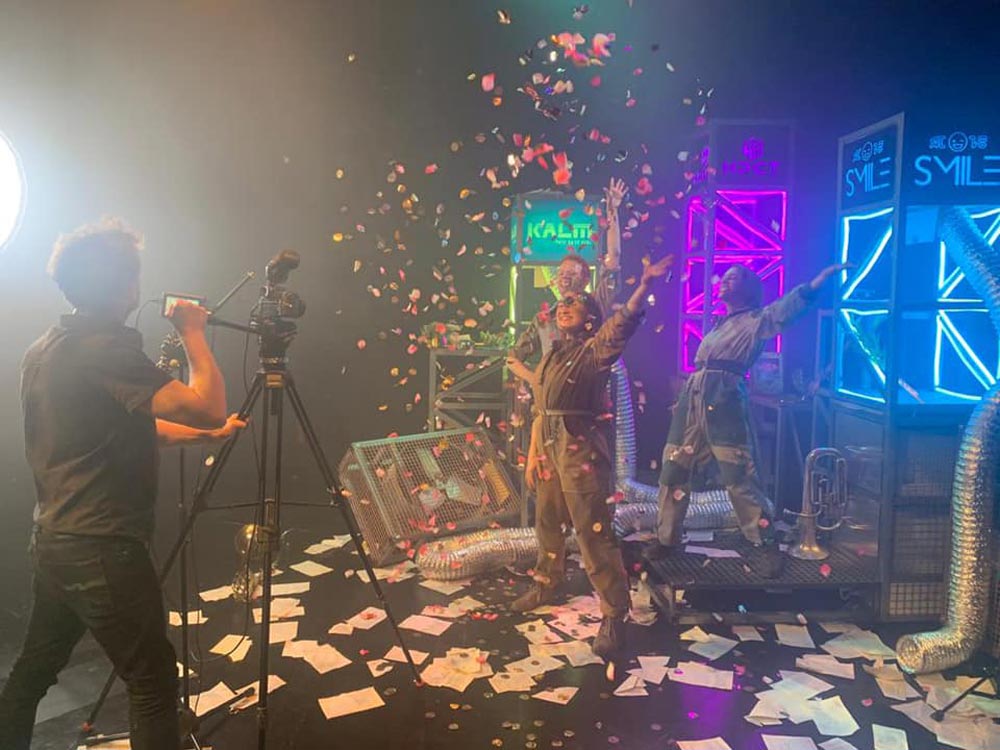
For both Lucy and Amber, their path was inevitable. Lucy explains: “I think as soon as we started the project at university, both myself and Amber knew how important this work was. We had both worked with people with learning disabilities before university and we both have family members with learning disabilities and to suddenly realise we could marry those two parts of our lives felt revelatory.”
Frozen Light’s performances are a sensory experience. The Isle of Brimsker was a production about an isolated lighthouse keeper surrounded by stormy seas. One audience member was quoted saying – ‘it was an incredible experience, for everyone involved, with lots to touch, smell, hear. A real experience for persons with complex needs to enjoy.’
Home, a story about friendship, loss and rebuilding relationships in a world of surprises, was described by Opening Night as a perfect example of ‘how theatre can and should push the boundaries and be a place of accessible exploration and inclusion for all.’
In developing new stories and theatre for adults with PMLD, the process familiar to the majority of writers and producers is turned upside down; Lucy describes the process as “flipping theatre making on its head”. Frozen Light always start with the sensory. The multi-sensory experience is the key to making their work accessible to audiences with PMLD, who access the world through the sensory.
Lucy explains: “we learn so much from our audience that we always come off touring one show with new ideas of what we want to explore in the next show. For example, in our show Home, we had a saxophone which audience members loved to touch and put their hands in to feel the vibrations. This led us to building our next show around the exploration of ways to experience sound and vibration. We then build an environment that supports those sensory ideas, put characters and music into that and then layered on the script – almost the last thing to appear.”
Considering the unique way that Frozen Light’s productions are conceived and developed, does this in turn allow the work to be accessed by other audiences that maybe experience sensory disorders in everyday life, such as neurodiverse people or those with Autism Spectrum Disorder?
“This is such an interesting question and I think the answer comes in two sections. Firstly, we make theatre for people who have some of the most complex needs of anyone in society. When you think about making work for this group by default it becomes accessible to everyone else. This is the gift that our audience gives us, that if the work is accessible for them then it is accessible for everyone. What baffles me is why more of society does not see this, that by catering for people with PMLD by default you can reach everyone else. I think society could stand to gain an awful lot of knowledge about accessibility by actively engaging with people with PMLD and learning from them.”
Lucy goes on to explain that Frozen Light “absolutely reach other people that face barriers in accessing theatre” such as autistic people and have a diverse range of audiences, but ultimately they make work for people with profound and multiple learning disabilities.
“The reason we are so specific about this is because people with PMLD are always the ones left out and forgotten. The arts doesn’t cater for them, let alone the rest of society; when places don’t even provide accessible toilet facilities (people with PMLD often need access to a changing places toilet to use the bathroom) then you know we have a long way to go. I have been to many “inclusive” events and seen those people with PMLD left in the corner and ignored. By making our work specifically for people with PMLD we know that no one will ever be forgotten at our shows.”
In 2020, Frozen Light were developing two shows, which were planned to tour in 2020 and into 2021. Both were due to visit The Civic during this time. However, once the pandemic hit, that tour was indefinitely postponed. When everything stopped in late March 2020, theatre companies around the UK locked down and went into survival mode. Frozen Light spent the initial months looking into how they could work with children being homeschooled with limited hours, no rehearsal room or performances.
At the start of the pandemic and the first lockdown, many theatre companies went into panic mode, looking at way they could engage with audiences using old filmed performances or learning resources, For Frozen Light, that meant putting out old educational resource kits for audiences at home but with no way of knowing if they were being used or not.
“What was particularly challenging for us, was reaching our audience in a way that was meaningful to them. Zoom and live streaming is cognitively very difficult, you rely on only two senses when all we know from our audience is that to be accessible for them, we use all the senses.”
Lucy reflects: “Our big realisation as the pandemic went on was that our audience was being forgotten. People with PMLD and by default the people who care for them are some of the most isolated and invisible in all of society and COVID-19 and shielding only exacerbated that. It was also clear that we were living through a historic moment and that people with learning disabilities’ stories weren’t being told or documented.”
Frozen Light decided to start a podcast to try and provide a platform for those stories and document them for the future. The podcast can be found at www.frozenlighttheatre.com/podcast. Through this endeavor, the company’s reach expanded, and they met many incredible parents, carers and organisations who generously shared their lockdown experiences. However, as wonderful as this experience was for Frozen Light, they realised that although they were reaching their audiences carers and families, they we weren’t reaching their actual audience.
For Frozen Light, a highlight of the last year was the development their audience panel. This is a group of people with PMLD and their family members/companions. Lucy explains, “this group has been invaluable to Frozen Light and have really guided the development of our thinking and work this year. Because of them we are about to release our first film. They have also guided us as to when they will feel safe to access theatre again and as lockdown eases, they will continue to be such a valuable resource.”
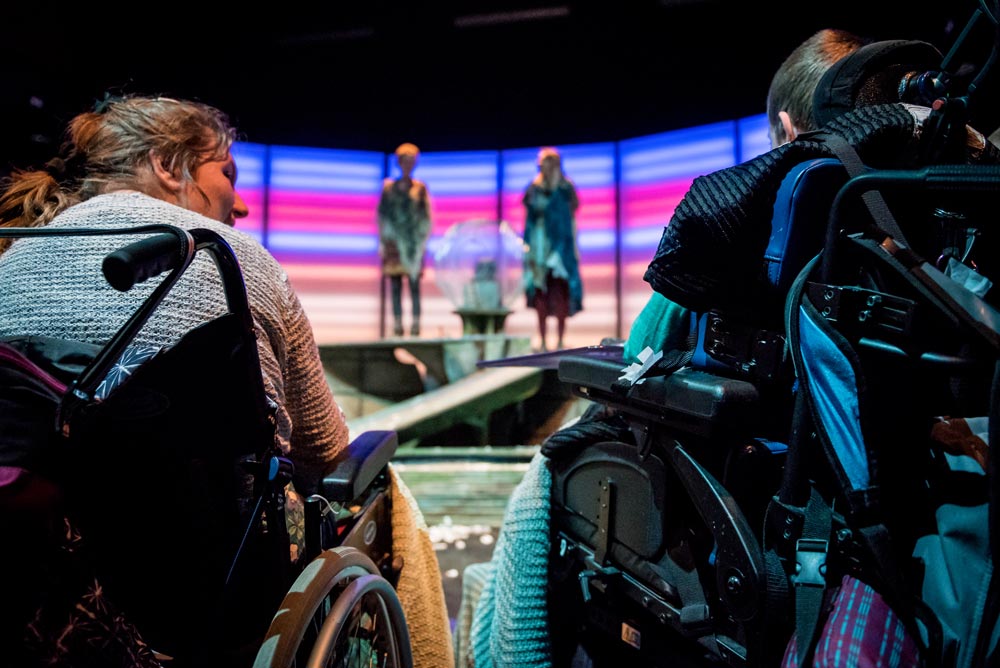
One of the important issues raised during the pandemic, was the importance of accessing culture remotely, be it via artist talks on Zoom, virtual exhibitions, or performances streamed to our mobile devices. Increased digital access to the arts was something that disabled communities have long-since campaigned for. However, it took millions of able-bodied and neuro-typical people to be locked down at home to prompt the sudden flurry of online arts and culture. Is this another case of the needs of disabled people not being met?
Lucy agrees, “Yes, and I think this pandemic has highlighted a lot of these issues. For example, it can be very difficult and stressful for some of our audience members to access hospital appointments, but they are always expected to attend. Yet as soon as the pandemic hit, they were suddenly allowed to have routine appointments on the phone which saved often long painful car journeys and stressful routine changes. I think at the beginning of the pandemic these changes were a cause for hope but the longer this goes on the more despondent I become. I think this has been particularly highlighted by how hard people with learning disabilities have had to fight to get their vaccines. People aged 18 – 34 with learning disabilities are 30 times more likely to die of COVID-19 than people the same age without disabilities. This is incredibly shocking but even more shocking that this hasn’t been taken into account when rolling out the vaccine. So, although the government finally announced people with learning disabilities would get their jabs, the fight it has taken to get there doesn’t fill me with hope that things will change for the better post pandemic.”
Theatres, museums, and galleries have a lot of online content right now and will continue to do so as we move into Autumn, but as ‘normality’ resumes and the majority go back to work and school, there will still be many millions of people at home – the people that always did and still do have barriers accessing the arts. Has the downtime of the last year enabled arts organisations to question their practice and the importance of striking a balance between delivering traditional on-site work and alternative methods of delivery and engagement?
The last year has certainly made Lucy and Amber think about their work differently. There have been periods where many of their audiences have been too ill to leave the house to engage with them and with their model of working before Covid, they weren’t able to reach them. With the support and guidance of their new audience panel, Frozen Light have made their first sensory film, which will have been released by the time this article has been published.
Lucy offers more detail: “2065: The Multi-Sensory Movie will arrive at your house in the form of a Rebel Pack (sensory box) which has everything in it you need to access the movie; the movie link and all the sensory props that accompany each section of the movie.”
2065 was originally going to be a show that was due to tour theatres in Autumn 2020 and is now postponed until September 2021, assuming there aren’t further lockdowns. As artists, the company were originally worried about spoilers and ruining the surprise of the show, with a film, but Lucy reminds me, “repetition is a fantastic thing for our audience with PMLD and the film can only help to make the theatre show a much more enjoyable experience for them when they are able to come and experience it.”
Having a film of their forthcoming show means that Frozen Light will be able to have their work seen by many more audiences, that may otherwise not have been able to engage with a traditional theatre model. However, it isn’t always that easy. Lucy says that the film was difficult to produce and definitely wasn’t cheap. The whole process and routes forward will be heavily evaluated at the end of their tour.
“If it wasn’t for Covid though, we never would have made the film and that would have been a shame, as we love it!”
And so what of 2021 and beyond. Do Frozen Light have Plan A’s and Plan B’s? Or is there a need to move forward slowly, with an ear to the ground?
First off, they have 2065: The Multi-Sensory Movie, which will be followed by a series of small nature-themed sensory experience boxes which has been commissioned by the Norfolk and Norwich Festival.
They are currently exploring more options for outdoor work this summer. However, any more than that is currently top secret.
Lucy finishes on an optimistic note: “Assuming the vaccine rollout and the government’s new roadmap goes well, and if our audiences feel safe enough, we plan to finally tour 2065 in September 2021. I am keeping all my fingers and toes crossed because I cannot wait to see our audience again, I have missed them all so much.”
Lucy Gardland is the Co-Artistic Director at Frozen Light.
For more information, visit frozenlighttheatre.com
